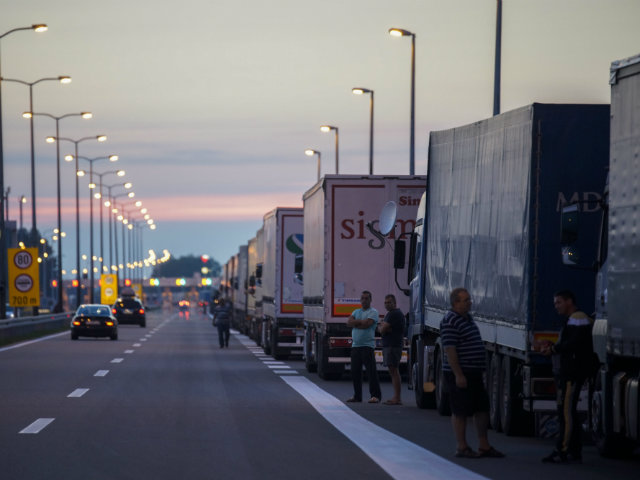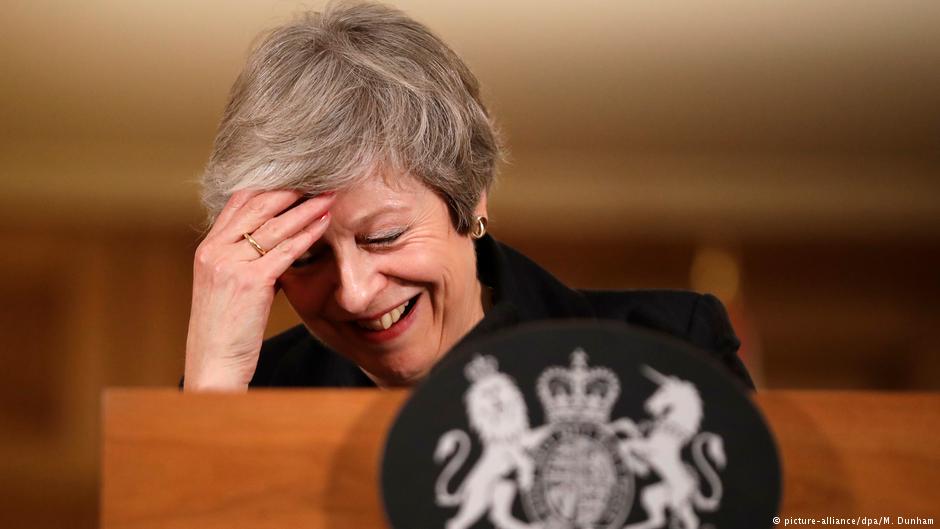EurActiv (18 November 2018)
The deal agreed between the United Kingdom and the European Union has detonated the biggest political dispute in British politics since Neville Chamberlain came back from Munich in 1938 waving a leaf of paper and proclaiming he had won “Peace in our time”, writes Denis MacShane.
Denis MacShane is the former UK minister for Europe. He has written three books on Brexit and advises companies and government on Brexit.
Far from uniting Britain after the bitterly divisive Brexit referendum vote when just 37 per cent of the total British electorate voted to leave the European Union, the Withdrawal Agreement and linked declaration on future areas to be negotiated, has launched a new round of recriminations.
Several ministers have resigned and others are forming a cabal to demand that prime minister Theresa May returns to Brussels and renegotiates a new accord.
There have been loud calls from senior Conservatives headed by Boris Johnson denouncing the deal as the end of a 1000 years of parliamentary supremacy in the UK.
The former minister of foreign affairs appears to think William the Conqueror brought with him a functioning House of Commons when he arrived in Britain in 1066.
This hyperbole can be heard for many other Conservative MPs who are demanding that Mrs May is replaced by a more passionately anti-European prime minister.
She meanwhile continues to insist that her deal is the best possible outcome. She has yet to find a clear majority of MPs to support her.
She is now paying to price for her handling of Brexit since she became prime minister in July 2016. Instead of reaching out to unify the nation, creating a spirit of bi-partisan cooperation, setting up working parties with the CBI and the TUC,, with universities, with different national regions of Britain – Scotland, Wales, Northern Ireland or with the Mayor of London and other big cities – she decided to speak only for and to the hardline supporters of Brexit.
She insisted “Brexit means Brexit”, and that “No deal is better than a bad deal” and denounced those who supported the idea of European citizenship as being “citizens of nowhere.”
She hoped this continuation of the anti-EU rhetoric after the referendum that produced Brexit would win her support. But when in 2017 she tried to capitalise on this by holding a general election she was badly defeated and the left-wing leadership of Jeremy Corbyn was endorsed.
She lost the majority the Tories won in 2015 and had to reply on hard right-wing protestant MPs from Northern Ireland who dislike Dublin, dislike Brussels, and refuse to apply UK laws on gay and women’s rights to the people of Northern Ireland.
Now the extreme protestant Northern Irish MPs say they will vote against her deal. So does the Labour Party, the Liberal Democrats, the Scottish and Welsh nationalists, and Green MPs.
If that block against the deal holds together and is joined by the anti-European Tory MPs who want a complete amputation with the EU – rejecting membership of the Customs Union, the Single Market, freedom of movement for Brits to live in Europe or EU citizens to work in Britain and a role for the court of justice of the European Union then the deal will not be accepted by the House of Commons and Mrs May cannot stay in office.
Supporters of a new referendum like Tony Blair and “People’s Vote” campaigners have also urged MPs to vote down the deal. All opinion polls now show a majority to stay in the EU. Each year in England about 700,000 older people die and the same number reach the age of 18 and can vote. It was older English voters who voted massively for Brexit while four out of five 18-24 year old voters voted to stay in Europe.
So the argument is that the majority for Brexit has disappeared. The former prime ministers, like the Tory Sir John Major and Labour’s Gordon Brown, urge a new referendum as does the Mayor of London and the editor of Rupert Mudoch’s paper, The Times.
Mrs May presents the demands for a new vote and a rejection of her deal as leading to economic chaos and collapse. She may yet win support as Angela Merkel and other EU leaders have said there can be no renegotiation. This is the only deal on offer.
Companies like Airbus and Siemens are stockpiling millions of spare parts. If MPs refuse the deal then the port of Dover through which 4,500 lorries arrive every day with food, medicines, and products will face delays for customs checks. South East England and the Calais region of France will become a giant parking lot for lorries.
Even if the deal is agreed, the EU and the UK have to negotiate a completely new arrangement covering everything from trade in goods ands services, aviation, to data protection, police cooperation, and human rights.
This will take years during which time the UK will de facto stay part of the EU even if formal political membership end next March.
Switzerland rejected the EU and even the European Economic Area, to which Norway belongs, in 1992. Ever since Berne and Brussels have been quarrelling. Is that the future for Britain? A Brexeternity of endless negotiations with Brussels? The Brexit saga for the United Kingdom is only just beginning.
No comments yet.
- LOCAL ELECTIONS BEGIN IN SLOVENIA The Balkans 19.11.2018
-
 KOSOVO TAX HIKE HALVES IMPORTS FROM SERBIA, BOSNIA
The Balkans
19.11.2018
KOSOVO TAX HIKE HALVES IMPORTS FROM SERBIA, BOSNIA
The Balkans
19.11.2018
-
 BRITISH PRIME MINISTER THERESA MAY: OUSTING ME RISKS DELAYING BREXIT
Europe - EU
19.11.2018
BRITISH PRIME MINISTER THERESA MAY: OUSTING ME RISKS DELAYING BREXIT
Europe - EU
19.11.2018
- EUROPEAN ARMY: NO LONGER A TABOO SUBJECT Europe - EU 19.11.2018
- IRAQI AIRSTRIKES KILL NEARLY DOZEN DAESH TAKFIRI TERRORISTS Iraq 19.11.2018
-
25.01.2016
THE ARMENIAN QUESTION - BASIC KNOWLEDGE AND DOCUMENTATION -
12.06.2024
THE TRUTH WILL OUT -
27.03.2023
RADİKAL ERMENİ UNSURLARCA GERÇEKLEŞTİRİLEN MEZALİMLER VE VANDALİZM -
17.03.2023
PATRIOTISM PERVERTED -
23.02.2023
MEN ARE LIKE THAT -
03.02.2023
BAKÜ-TİFLİS-CEYHAN BORU HATTININ YAŞANAN TARİHİ -
16.12.2022
INTERNATIONAL SCHOLARS ON THE EVENTS OF 1915 -
07.12.2022
FAKE PHOTOS AND THE ARMENIAN PROPAGANDA -
07.12.2022
ERMENİ PROPAGANDASI VE SAHTE RESİMLER -
01.01.2022
A Letter From Japan - Strategically Mum: The Silence of the Armenians -
01.01.2022
Japonya'dan Bir Mektup - Stratejik Suskunluk: Ermenilerin Sessizliği -
03.06.2020
Anastas Mikoyan: Confessions of an Armenian Bolshevik -
08.04.2020
Sovyet Sonrası Ukrayna’da Devlet, Toplum ve Siyaset - Değişen Dinamikler, Dönüşen Kimlikler -
12.06.2018
Ermeni Sorunuyla İlgili İngiliz Belgeleri (1912-1923) - British Documents on Armenian Question (1912-1923) -
02.12.2016
Turkish-Russian Academics: A Historical Study on the Caucasus -
01.07.2016
Gürcistan'daki Müslüman Topluluklar: Azınlık Hakları, Kimlik, Siyaset -
10.03.2016
Armenian Diaspora: Diaspora, State and the Imagination of the Republic of Armenia -
24.01.2016
ERMENİ SORUNU - TEMEL BİLGİ VE BELGELER (2. BASKI)
-
AVİM Conference Hall 24.01.2023
CONFERENCE TITLED “HUNGARY’S PERSPECTIVES ON THE TURKIC WORLD"









